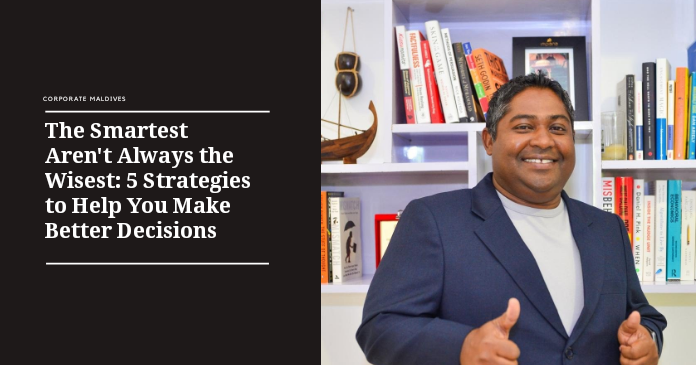
“Why do you stay in jail when the door is open?” ~ Rumi
I interpret this as us being held captive by our thoughts and perceptions. Quite often we are told that we possess great potential and the only limiting factor is our imagination. Ironically, our ability to think, imagine and make meaning of what we perceive through our senses is perhaps our greatest ability as humans.
Rumi said this many centuries ago. Philosophers and scientists have believed this for a long time. From Plato to Descartes, we have been asked to question our judgment and reconsider our perceptions over and again. Imam Ghazali suggested that while our dreams ‘feel’ real while we sleep, we know for a fact that it is an illusion and likewise we do not have any evidence to say for certain that what we perceive during our waking hours is any closer to objective reality.
********
Some literature suggests that we make about 32000 decisions a day. On average, that is about 2000 decisions per hour. Interestingly, close to 200 of these decisions are to do with food. Some of these decisions are to do with the many choices we have in our lives. From what to wear, what to eat for breakfast and what to watch or read. We like to think more choices as a luxury or privilege but cognitive psychologists believe this exhausts our cognitive ability and the accuracy of our decisions suffer towards the end of the day as our capacity to accurately evaluate depletes with each new decision. I would perhaps never understand the reason why we have more than 20 different types of Basmati rice in the neighborhood shops on a small island in the middle of the Indian Ocean!
The following are 5 strategies for decision making that I have come to appreciate for some time now. This is the distillation of my understanding of Gladwell (Blink), Gilovich & Ross (The wisest one in the room), Kahneman (Thinking, fast and slow), Dobelli (The art of thinking clearly), Ariely (Predictably Irrational) and many other writings on thinking, judgment, rationality and decision making.
Work on your self-awareness
Knowing what makes you think what you think is an important step in thinking clearly. We see the world through lenses, filters, windows, and keyholes. How we come to develop these is based on many things including culture and environmental stimuli. We are all victims of implicit bias and most of us will deny that fact simply because we do not know and we would not want to be biased if we knew it. Over time, societal and cultural norms, values, and narratives make us develop these biases and prejudices on gender, gender roles, race/ethnicity, nationality, age, skin color, and many more aspects of humanity and our lives. I find https://implicit.harvard.edu to be very helpful in understanding the extent of some of these biases on our subconscious mind. Self-awareness can also help us understand our own emotions. Our emotions shape perception and in a world where we are constantly tethered to smart devices that work on algorithms specifically designed to display imagery and language to elicit certain emotions in us, we need to be super vigilant. Stroop effect and McGurk effect distort what we see, hear and perceive. Our minds are constantly primed and messages are framed to elicit action from users and we get caught in this unconsciously.
Learn about heuristics or mental shortcuts
We tend to associate smartness with IQ and the ability to respond to logic questions quickly. Many organizations base their recruitment selection on an applicant’s performance on a battery of IQ tests. Results from cognitive reflection tests suggest that our thinking has 2 modes. Kahneman calls this 2 systems. The one that generates quick responses is system 1 and this ability is based on some heuristics or mental shortcuts we develop throughout our lives. This system can sometimes deceive us. What we think is correct, accurate or true can indeed be the opposite. Learning about these shortcuts can help you stop making snap judgments and rushing to conclusions without evidence. First impressions and snap judgments cause pain and regret in many circumstances. Cognitive science has established that what we perceive through what we hear and see is greatly shaped by these heuristics.
Find out about many different biases, illusions, fallacies and effects that could render our decisions suboptimal
A quick Google search will produce many leads documenting and discussing these biases. Marketers have employed and exploited these to take advantage of gullible consumers for years. Anchoring effect makes us buy things that we will otherwise find unreasonably expensive. Illusory superiority or the Dunning-Kruger effect makes us believe we are better people than we are. Curse of knowledge makes us blind to the understanding of those who do not possess that specific knowledge – this is a lot of us have difficulty in understanding ‘User Manuals’. Hyperbolic discounting irrationality makes us better people tomorrow. We all have great intentions, to pray 5 times, eat healthy food, wake up early, exercise more and check up on friends and family – but not today, we will do it tomorrow. In Dhivehi, we refer to this type of procrastination as “I’nbileehu kaeveni” or Satan’s wedding, something that never happens. Some of these effects and how much we understand it is very much dependent on the context. I remember Professor Ugail rephrased the bat and ball question to a dress and a set of earrings for the Maldivian audience in one of his columns for Haveeru. The list of biases, illusions, effects and fallacies run into the hundreds. It is therefore impossible for us to educate ourselves on all of these distortions but reading and exploring can us more up to date and more vigilant. We can employ more commitment and debiasing tools to keep us honest and more rational. One such psychological device is the Ulysses contract. This can help us become better people tomorrow by committing to a course of action today. If you want to eat healthy tomorrow, prepare your meals today and leave them in the fridge or in our culture where food is only cooked when it is time to eat, buying and stocking your kitchen may be enough. We could also be influenced by the ‘sunk cost’ effect as well.
Think in systems
Everything is connected. From chaos theory to globalization, the world, our lives and the events that shape our lives are interconnected and intertwined. Who would have thought that our gut bacteria could be affecting our mood and our diet promotes the growth of or depletes the population of some of these colonies making us happier or sadder depending on what we eat? By the way, eating bananas are supposed to make you happier. We take action many times without paying attention to the consequences that decisions will result in. My community in Fuvahmulah have learned the hard way that eliminating crows was directly related to the dying of breadfruit trees. For us, crows were a pest that we had to get rid of and none of us realized that this would lead to a population explosion of the longhorn beetle that feeds on the marrow of the breadfruit tree. There are many examples of this type of naive mistakes we make that result in grave consequences. Unfortunately, we realized these things much later, on hindsight when it is already a little too late. Holistic thinking should be employed everywhere when making decisions to avoid expensive mistakes.
Always question your judgment and that of your team
I have become a lot more skeptical since I turned 40 and I believe this makes me a little wiser (then again, it may be an illusion). Observe any average child of 3-10 years of age and pay attention to how inquisitive and curious they are. They have so many questions and want to know everything. I find it fascinating how we all become less and less curious as we grow up. Why? I don’t know but I like to think becoming more inquisitive and curious can make us make better decisions. Our belief in science is based on the rigorous, structured methodology that scientists employ to arrive at that conclusion. Surprisingly, we do not care about the scientific method when it comes to decisions that will have lifelong impacts. In Maldives, we have a very high divorce rate and most us of vowed to stay married forever the one we thought was the perfect partner. What deceived us? We seem to rely on too many hunches, gut feelings and intuitions instead of thinking through. We seem to be letting our emotions take over our rational elements too often where we end up making impulsive buying decisions that we regret later. If you have a decision to make, always question your thoughts as much as possible, think it over, compare the pros and cons before concluding.
*******
We are busy. We have too many decisions to make and too little time to think these decisions over. That is why we outsource these decisions to our system one but unfortunately end up paying hefty prices for the mistakes. We are all constantly connected and that is a good thing but little do we realized that we live in echo chambers and virtual “Big Brother” settings where we are constantly monitored and controlled by Artificial Intelligence run on algorithms. Remind this to yourself daily. The continuous scroll feature of your social media apps are perhaps your greatest weaknesses and they waste much more of your time than you realize. Debiasing, and thinking clearly in a world with distractions left, right and center is a deliberate process that requires your system two. Quran instructs us to contemplate, think, and question what we see, hear, and perceive.
Think.
About the writer: Hassan Saeed is a hotelier with over 28 years of experience in Maldives tourism and resort operations. He is passionate about behavioral economics and how concepts like ‘Nudge’ can be applied in service settings. Hassan identifies himself as a lifelong learner. He currently holds the position of Resort Manager at Dhigali Maldives.











